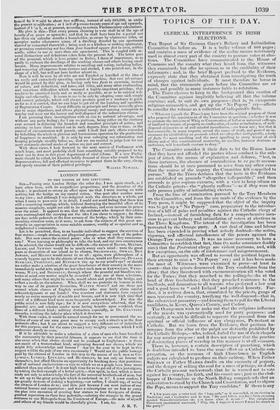LONDON BRIDGE.
TO THE EDITOR OF THE SPECTATOR.
SIR—Passing over London Bridge the other day, I was again struck, as I have often been with its magnificent proportions, and the grandeur of the whole : it produced so strong an effect upon me that I went musing on with nothing but the bridge on my mental retina. One part after another arose to my view; and although I was delighted with the structure as a whole, yet when I came to pass over it in detail, I could not avoid feeling that there was still a something wanting, which, without destroying the beautiful effect of its massive simplicity, might yet add to its splendour, and even increase its power over the mind. It appears to me, that the architect who designed this edifice even contemplated the carrying out the idea I am about to suggest; for there are four noble pedestals at the four corners of the bridge, which by their com- manding situation seem, as it were, to ask from the citizens of this great me- tropolis an appropriation in some suitable manner, worthy of so opulent and so enlightened a community. Let it be permitted, then, to an humble individual to suggest the erection of four statues—simple statues, not allegorical groups—one on each of the pedes- tals. But now comes the critical point : who or what shall they commemo- rate? Were learning or philosophy to take the lead, and our own countrymen to be selected, the choice would not be difficult—the names of BACON, MILTON, LOCKE, and NEwrox would be in nearly every one's mind : were the great poets or dramatists of our island to be chosen, SHAKSPEA RE, ()TIP AY, BEN JONSON' and MILTON would occur to us all : again, were philosophers of a scarcely bygone age to be the objects of our choice, would not Ros COE, DUG A Ln STEWART, PRIESTLEY, and BENTHAM rise up to our mind's eye? or should we rather make a selection of the great benefactors of their count!), in the more immediately useful arts, might we not select such men as A RKWD MDT, WEDG- WOOD, WATT, and BRINDLEY through whom the peaceful and bloodless vic- tories of mind over matter might be recorded ?' Any one of these selections, and many others that might be made, would adorn and perfect the bridge, and
i reflect a credit on the selector. When shall we see posterity do honour n this way to one of its greatest fivourites, WA LTER SCOTT? and are there not several whole classes of English worthies who may fairly claim similar acknowledgments at our hands? Our warriors and statesmen have enjoyed nearly an entire monopoly of marble and bronze, and it is now high time that merit of a different kind were more frequently acknowledged. For this the public mind is now fully ripe ; for it is now everywhere admitted, that the peaceful arts and sciences confer more lasting benefits upon mankind, than those of a different kind; • military distinction especially, as Dr. CIIA NNING remarks, is taking the inferior place which it deserves.
With these views, it would be natural enough for me to recommend the se- lection of some of our own great men to occupy such a situa:ion as the four pedestals offer; but I am about to suggest a very different set of individuals for this purpose, and for the same (to me) very weighty reasons, which I will endeavour shortly to state. If it be advisable to make a selection of a class of men who have benefited the community by their peaceful labours, it appears to me that the time is also come when that choice should not be contimed to Englishmen : is there not merit of a transcendent kind, originating hevond our shores, which we might fitly acknowledge and honour ? Are we ihr ever to he kept in this respect within the pale of our own community ? Would not the public homage paid by the citizens of London in this way to the manes of such men as CO. LUSIRCS, LUTHER, LINNXI/S, and HUMBOLDT, be not only an honour to themselves, but afford likewise an opportunity for breaking down that partition- wall of national exclusiveism—a lace to which we as a people have been more addicted than any other ? Is it not high time for U9 to get rid of this just stigma, by setting the first example of a better spirit,—that spirit, in fact, which is most ready not only to acknowledge the fact of the universal brotherhood of man. but to act up to the great principle which is enshrined in it? I must confess. I am greatly desirous of making a beginning,—or rather, I should say, of seeing the citizens of London do so; and this, just because I am most jealous of our national honour and reputation : and were a subscription set on foot to carry the plan into execution of electing four statues to four foreigners of distin-
guished reputation on these four pedestals,—saluting the stranger in the grand entrance to our Metropolis from the Continent of Europe,—the mite of myself and others of my friends would be cheerfully given. I am, &c.
J. R. T.


























 Previous page
Previous page